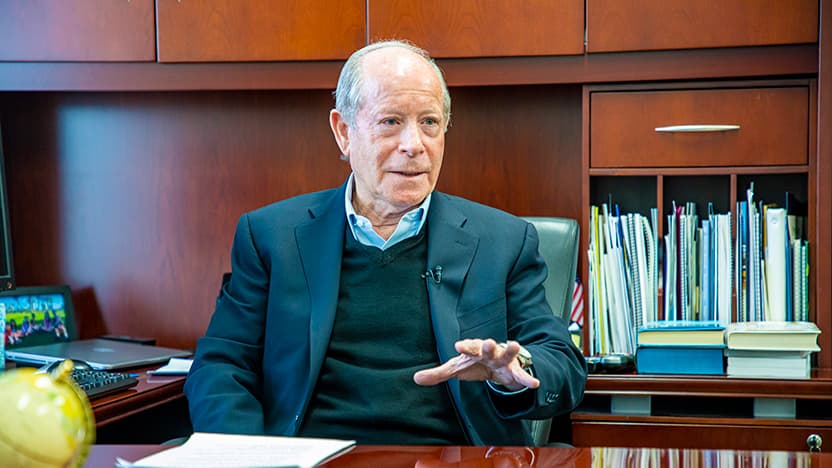$10 million gift accelerates research to improve cancer therapies, extend benefits to more patients

Researchers at the University of Chicago Medicine will come together to develop personalized therapies for hard-to-treat cancers, thanks to a $10 million gift from the Jonas family.
The gift establishes the David and Etta Jonas Center for Cellular Therapy at UChicago Medicine, named for David Jonas and his late wife, Etta.
The center unites a team of experts dedicated to improving cellular therapy, especially T-cell treatments like CAR (chimeric antigen receptor) T-cell therapy, an emerging form of cancer treatment. CAR T-cell therapy works by supercharging patients’ white blood cells to seek out and destroy cancer cells. Although this therapy has, in some cases, led to complete remission, it is not always successful and is currently limited to treating certain blood cancers.
Through the David and Etta Jonas Center for Cellular Therapy, researchers at UChicago Medicine will work to overcome these challenges and realize the full potential of cellular therapy. This includes efforts to improve the therapy’s overall effectiveness and extend its benefits to a much broader group of patients, including those with cancers that are currently difficult to treat.
“I was impressed by UChicago Medicine’s multidisciplinary research program and commitment to attaining tangible outcomes that will really serve cancer patients,” Jonas said. “They have all the key elements for a successful research program: experience in clinical trials, access to the most leading-edge technology, a tremendous track record in attracting scientific talent, and a strong team to lead the program.”
Developing truly personalized therapies
T-cells patrol our bodies, searching for signs of infection and disease. When T-cells detect an abnormal protein on the surface of a cell, called an antigen, they latch onto it with a matching receptor. Like puzzle pieces, the antigen and T-cell receptor bind together, triggering an immune response that destroys the cell.
Some cancers, however, develop ways to trick the immune system, such as by disguising themselves as healthy cells or by shutting down the immune response altogether. CAR-T cell therapy helps to resolve this by modifying patients’ T-cells in the lab, so they can better recognize and target cancer-specific antigens.
However, there isn’t a “one-size-fits-all” approach to targeting antigens since they are unique to each patient and his or her tumor; nor is there a reliable method for predicting which antigens a given tumor will express. To address these challenges, acute lymphoblastic leukemia (ALL).
Bishop suspects that the “fitness” of patients’ T cells may determine if, and how well, they respond to therapy. Like a soccer team, it is important that patients’ T cells are not only fit enough to successfully take on their opponent (the cancer), but they must also be able to sustain their energy long enough to defeat their opponent and win the game.
By identifying the qualities that make T cells “fit,” Bishop and his colleagues seek to predict how a patient will respond to the therapy in advance. This way, a patient’s T cells could be sequenced prior to undergoing treatment—allowing physicians to gauge if their immune system will be able to wage a successful attack against the cancer. In cases where the patient’s T cells are deemed unfit, the researchers aim to develop interventions to improve their fitness.
“This is the most exciting time in my entire career,” Bishop said. “We finally have hope for patients who previously didn’t have hope. And now we are working to improve upon these results. Within the next 10 years, I think these treatments are going to become more effective, less toxic, and most importantly, will give new options to a broader scope of patients.”
Building an infrastructure for success
The Jonas family’s gift will provide essential funding to advance research initiatives, while also putting in place the necessary infrastructure to sustain a successful research enterprise in the years to come. To this end, the Jonas Center will allow for:
- Recruitment of leading experts in T-cell biology and cell engineering
- Expansion of research and clinical trials infrastructure
- Acquisition of specialized technology and equipment necessary to translate discoveries made in the laboratory to the clinic
- An annual lecture that brings together leaders in cellular therapy and fosters dissemination of the latest innovations in the field
“We feel extremely proud and appreciative to have the opportunity to partner with the University of Chicago in this effort,” Jonas said. “We see our contribution as the seed for building a robust program that will lead to the next breakthrough in cancer therapy.”
This gift represents the single largest donation to UChicago Medicine for cellular therapy research.

CAR T-Cell Therapy
CAR T-cell therapy supercharges a patient's white blood cells to find and destroy cancer cells. UChicago Medicine research played a key role in the development of this exciting new immunotherapy.
View videos and learn more